Ground Reports
Jharkhand: Sliced Between Two Assembly Segments, Jamtara's Cyber Crime Hub Witnesses A Generational Shift
Abhishek Kumar
Nov 18, 2024, 05:50 PM | Updated Nov 20, 2024, 05:48 PM IST
Save & read from anywhere!
Bookmark stories for easy access on any device or the Swarajya app.
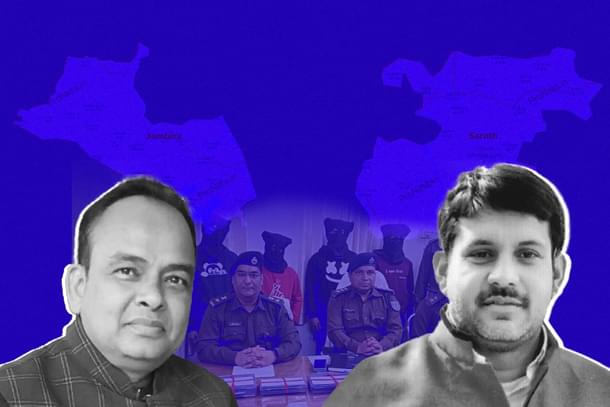
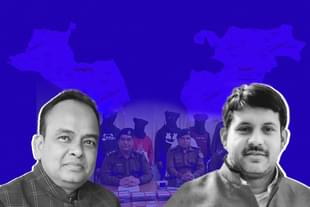
It was around 2016 when Amitabh Bachchan confessed that Rs five lakhs were looted from his bank account by cybercriminals posing as a bank manager. He also expressed his wish to meet the one who executed this well-thought-out plan.
The thugs belonged to Jamtara—a city living under the shadows of its big brother Dumka, which is also a Lok Sabha constituency. At that time, around 70 percent of cybercrime complaints in India could be traced back to this place.
Later, many more victims—both celebrities and the general public—opened up, giving Jamtara its infamy. News, small and large documentaries, and even a web series with an IMDb rating of 7.3 were made on it.
Jamtara is now a tainted name in India. Locals from here do not want to get associated with it. “When we go outside, we tell people that we are from Dumka or Godda. What can we say? They will misunderstand us as criminals,” said Umesh Mandal, a local.
It is extremely hard to reach Jamtara by public transport. One has to change multiple vehicles from holy Deoghar to reach there. Connectivity was worse more than a decade ago.
As one enters Jamtara, it looks more developed than other districts of the Santhal Pargana division. Eateries and intra-city travel avenues are certainly better inside Jamtara. Inside the city, people have got accustomed to such fraud cyber calls and blame two locations especially for producing cyber thugs.
The activity which Jamtara is infamous for is concentrated in two centers only—Karmatanr and Narayanpur. Narayanpur, though, was late to join the race. Traversing through both these places, it's common to see children from the poorest families playing games like Free Fire on expensive handsets, often under the guidance of seniors who use these games as a stepping stone for further influence.
They generally pick two spots to execute their scam operations. The affluent ones of the bunch use their rooms, while the lesser ones go to the vast open forest areas to make calls, which range from 100 to 200 per day.
The modus operandi is also witnessing a shift. Though the main source is still calling people by posing as different officials, now, instead of demanding details, they already possess them.
Their tech teams have become capable of fake link generation, through which they ask customers to make payments (for electricity, water, etc.).
The police are also extremely active in these areas. Just visiting social media handles of Jamtara Police will tell you that no matter what, the raids do not stop. Almost every second day, nearly half a dozen people are arrested, lakhs of money recovered, and the police begin their preparation for convicting the criminals.
Looking at the gravity of the problem, Jamtara Police has established a specialized cyber cell for these crimes. Contrary to the image of the police, the cyber cell is filled with the most efficient of the bunch.
“When police from metros like Chennai arrive, we have to tell them how to proceed or which section they should have applied after the complaint,” said a senior police officer.
When a complaint is filed outside Jamtara (mainly in metros), police generally register it under IPC Section 420 (Section 318 in BNS) or the IT Act. “We are cognizant to add IPC Section 467 (Section 338 BNS) as a fake link is also created. The punishment is harsher under this section,” said another cyber cell officer.
However, a major problem the police face is the apathy of victims towards conviction. For victims, it is mainly about recovering their money and jailing the criminal. That leads to many FIRs pending for a long time—showing as incomplete cases—simply because victims do not turn up on court dates.
For anyone with common sense, it is not difficult to understand that, over a period of time, the system develops a tendency towards dispute resolution, and apprehensions are done mainly for intimidation.
“What will they do when victims themselves are not willing to fight their case?” said Rajesh, an advocate in Ranchi High Court who frequently gets clients from Jamtara.
Karmatanr was not always like that, though. It has a rich history of hosting renowned educationist Ishwar Chand Vidyasagar, who lived here for two decades in a small hut. He opened a girls’ school and campaigned for the ban on child marriage and for widow remarriage. The Karmatanr station is also named after him.
The cultural shift began in the late 1980s. Like Wasseypur was for Dhanbad, Karmatanr became the same for Dumka. Chain-snatching, drug abuse, looting from train passengers, and even organised dacoity became the norm here.
Like it happened in Bahraich recently, in those days, two-tier policing was the norm across the whole of Bihar. Karmatanr has a high Muslim population, which meant that it remained virtually insulated from law enforcement.
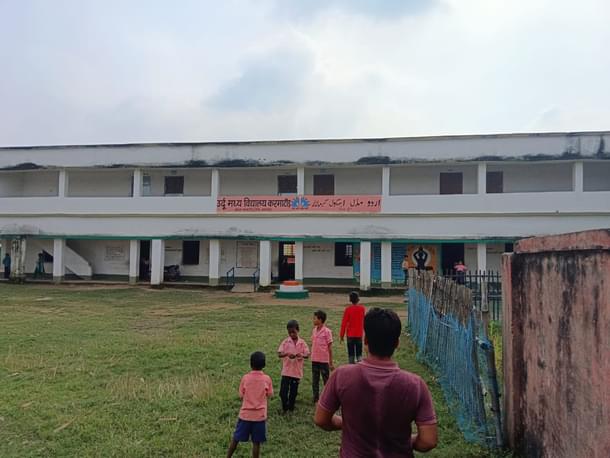
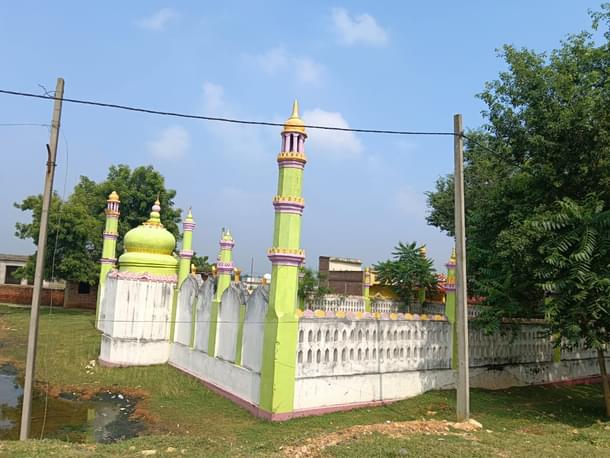
“We did not use to come here after 4 PM. Even simple traveling on the road was akin to suicide. Even today, if someone offers us anything, we won’t eat it. Now I have more reasons to not eat,” said Vijay, referring to viral videos of spitting in food.
The police did not remain silent for long though. Local police and the Railway Protection Force joined hands to curb these incidents and were able to minimize them to single digits by 2003-04.
However, Karmatanr youth quickly adapted to technology and shifted to new modes of loot.
They learned these tricks after working in mobile shops in metro cities.
Altaf Ansari, Ata-ul Ansari, and Sitaram Mondal are said to have scaled it to an industrial level. Even members of Parliament and the wife of Captain Amarinder Singh, the former chief minister of Punjab, were not spared.
It took the 4G revolution of Jio for the world to understand how big the problem was. As police raids increased, experienced criminals started to hide, and a lot of them retired by investing their money in different businesses.
“For instance, sir, if you are in Karmatanr and find a random tent business or any business which provides services for events like marriages or other functions, there is an 80 percent probability that it belongs to one of those who have left cyber loots,” said Mukesh Mondal.
Priyanshu, (name changed), a 17-year-old involved in such acts says that the tricks of the previous generation have become outdated now. Most of his targets now simply cut the call or take a clue from Truecaller and do not even pick up the call. That is why they have resorted to fake link generation.
“A lot of times, one of us is on call while another one has simultaneously placed orders on Amazon. As soon as the target gets trapped, she (in his case) places the order. In this way, we do not loot but order something from the victim’s account. It complicates the problem for the police,” he added.
With time, the loot has changed Karmatanr and Narayanpur in a big way. Once resembling small rural settlements like old Sant Kabir Nagar in Uttar Pradesh, these areas are now bustling with big constructions.
They host electronics showrooms, four-wheeler dealerships, and mini supermarkets—facilities previously found only in the main town of Jamtara.
“Showrooms in the main urban center were receiving more orders from these places, prompting us to set up branches locally,” said a bike showroom employee.

The rapid influx of wealth has triggered a construction boom, with numerous homes in various stages of completion, often funded through incremental payments. While some homes were completed, many of them were left midway.
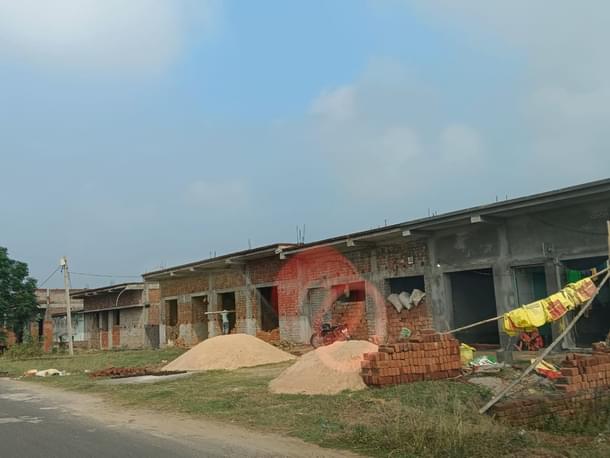
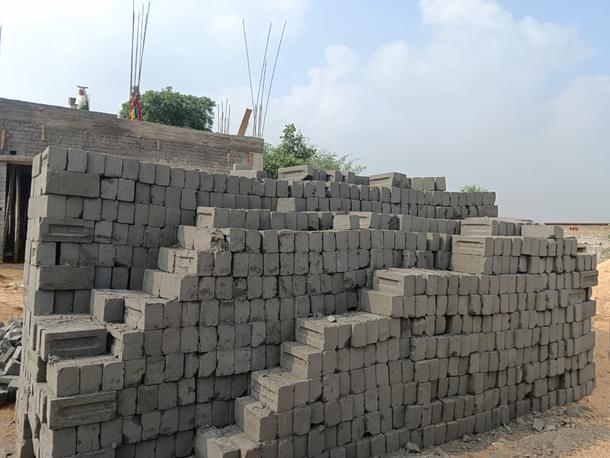
“What happens, sir, is that suppose they loot 10 lakhs in one month, so they begin their house work. Suddenly, they do not get more, or the police arrest them. Then the construction stops, which is why many of them are lying like that,” said Pradip Mondal.
The cost of construction materials, like bricks, has risen sharply, reflecting the increased demand. Amid this development, luxury homes featuring remote-operated systems have emerged, a surprising addition. Owners of such luxuary homes take due care in constructing them away from public gaze - 500-1000m away from main roads.
“Engineers from Kolkata had come to plan and execute this setup. They are not small thieves now. They have become big, really big,” said Baijnath Pandit, who runs his snack shop in Patiardih.
On his old and fading face, it is easy to see the guilt of living life on honest terms. He taught his children to be honest, and one of them opened a coaching class. Just when his classes were becoming a big hit, neighbours started constructing large buildings and buying expensive items from the loot money.
Resultantly, kids who were taking tuitions till now were pulled towards it. “Can’t really blame them, to be honest. They see that with studies, it would take at least a decade to earn 40–50 lakhs. But with an ATM (local name for cybercrime), they could do so in two to three years. A young brain would obviously go there.” added Baijnath.
What were once modest villages have now become pockets of prosperity, driven largely by the influx of unaccounted-for money. This influx has changed the social and economic fabric of Narayanpur and Karmatanr, turning them into unlikely centers of wealth and modern amenities in the region.
All these developments have meant that people of both Karmatanr and Narayanpur can exercise free will in picking their leaders without considering freebies or other benefits in mind.
Narayanpur comes under the Jamtara Assembly constituency. After Shibu Soren, Irfan Ansari, a Congressman, took charge in 2014 and consolidated his position. His father, Furqan Ansari, was also a politician, having won this seat in 1985, 1990, 1995, and 2000.
His father’s legacy and demography (more than 38 percent of voters are Muslims) are the reasons why he keeps winning from Jamtara, despite a controversial past. The story of Muslims voting en bloc for a particular candidate gets repeated here.
This time, though, it could be difficult for him. His rival is Sita Soren, brother-in-law of Hemant Soren. Sita Soren ditched Jharkhand Mukti Morcha (JMM) before Lok Sabha elections.
Despite her credentials, tribals—which comprise nearly one-third of the Jamtara population—see the hand (Congress symbol) and bow and arrow (JMM symbol) in tandem.
But Irfan Ansari made one massive blunder by attacking Sita Soren and calling her 'rejected maal'. Bharatiya Janata Party (BJP) got a much-needed opportunity to galvanise its supporters and tribals around the issue.
Incidentally, disrespect for tribals is the card Hemant Soren’s JMM played during Lok Sabha elections after getting arrested in a corruption case. Now BJP is also repeating the script and has been on the offensive ever since.
Sita Soren has also galvanised old people loyal to her family (Sita and her deceased husband, Durga Soren). She, along with BJP, deserves credit for keeping the issue afloat till the last day of the election campaign. However, it has been more impactful on women voters than tribals in general.
“Those who do not have manners to talk to a woman are contesting elections,” said Nusrat, a woman near the community library in Narayanpur.
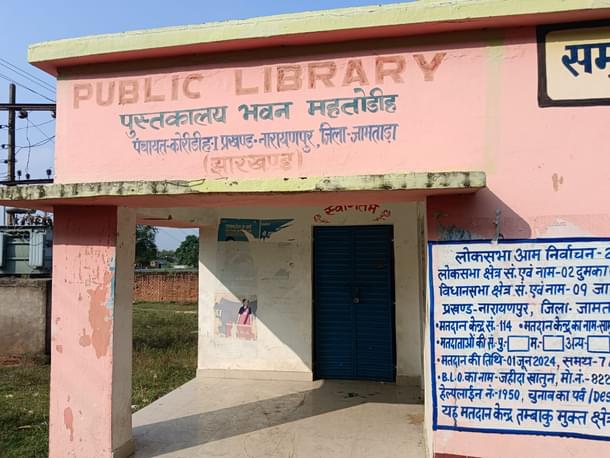
On the contrary, most tribals I interacted with seemed unaware of the controversy itself.
Karmatanr comes under the Sarath Assembly constituency, which is represented by Randhir Kumar Singh of BJP. Singh is extremely popular here due to his philanthropy and easy-going nature. Despite being a Bhumihar, he enjoys cross-community and cross-religion popularity.
“You go to him and ask Rs 50,000 from him for a programme. Yes, he won’t give you the full money, but rest assured for at least Rs 30,000,” said Mrityunjay.
JMM candidate Uday Shankar Singh is relying on two other candidates—Md. Azharuddin and Saif Ahmad Yaqub—to cut some Muslim votes from Randhir’s kitty. Incidentally, it could end up decreasing his own share as well since in larger vote bloc narratives, Muslims vote for JMM.
The average Karmatanr voter, however, only decides on the day of voting. Voters of a few Karmatanr booths, which come under the Jamtara Assembly constituency, are certain to vote for Irfan Ansari. However, the situation changes for other booths - which come under Sarath (more than 90 percent) since Randhir is a popular name here.
The government's push
On its part, the administration took some commendable steps to check the descent of the region in crime though. Establishing a Cyber Crime Police Station is one of them. Running awareness campaigns is another.
Increased raids and vigilance have helped to reduce the absolute number of incidences, but there is hardly any reason to believe that turnover has come down.
The new generation is more innovative in its approach and aims for big fish. So, earlier, if one successful phone call would yield Rs 5,000–10,000, it now yields well over Rs 1 lakh. For being refined in their accent, they even bring people from different states, host them, get them to execute their plan, and then send them back.
Slowly but, Jamtara’s rank in cyber complaints started to go down. Currently, it is at number eight—a remarkable improvement considering the sentiment around it a few years back.
To improve Jamtara’s image, the government took a noble decision to set up a library in every village of Jamtara. The libraries are modern, contain all essential books, smart TVs for educational programs, and are well maintained.
However, in Narayanpur, it flopped right from the beginning. Locals complain that earlier they could use the compound for housing their guests, which is not possible now since the room is a library and no one comes here, due to which it remains closed.
In Karmatanr, the library performed a bit better. Located near an Urdu medium school—which is also fully functional—it thrived in the initial 12 months. Students used to study whole night, and its manager also enjoyed serving the facility.
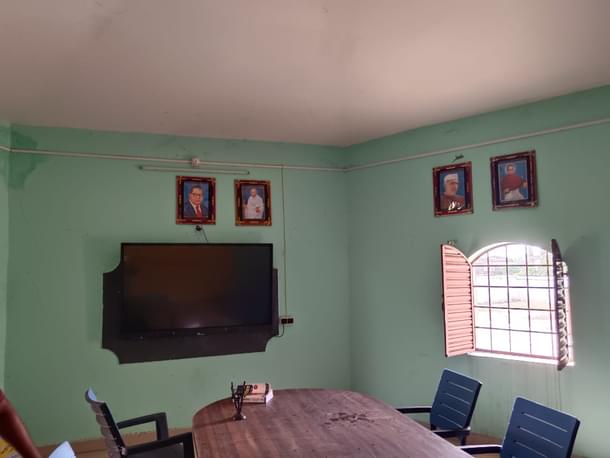
Many students took admission in big cities’ colleges after toiling hard from here. However, the numbers started to go down from late 2023, and it has not seen a single reader for the last two months.
“I try my best to keep it clean, but I also need to run my business. If students come, I am ready to serve, but I can’t keep going and nudge them every day,” said Salauddin, the manager of the library.
The principal of the Urdu medium school blames culture for this problem. “In our Muslim society, there is absolutely no zeal for educating our kids. Just give birth to them and let them do whatever they will. That is not how it works. Only menial jobs or this cyber thugging can be done with this attitude.” said Imtiaz Alam, who is well respected for his work ethic.
For Jamtara, escaping its notorious past seems an uphill battle, even as it navigates the complexities of demography and crime.
Abhishek is Staff Writer at Swarajya.





